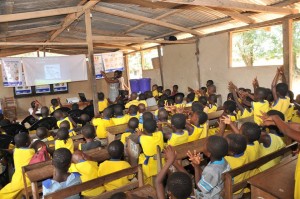Location: Kumasi, Ghana
Participants: 560
Organizations: Scientists Networked for Outcomes from Water and Sanitation (SNOWS), with support from the Wellcome Trust, U.K; Kwame Nkrumah University of Science and Technology, Kumasi-Ghana
It has not been long since Africa was hit by the Deadly Ebola Virus. Although as of now, Ghana has not been hit by the disease, we cannot say same for Cholera which has claimed over 150 lives between July and October 2014. Experts have explained that hand hygiene and good environmental practices is key to preventing the disease. Therefore, as part of activities to mark the Global Hand Washing Day, the Scientists Networked for Outcomes from Water and Sanitation (SNOWS) Project, hosted by the College of Engineering (CoE) of the Kwame Nkrumah University of Science and Technology (KNUST) has embarked on a community outreach programme to educate pupils of the Sokoban Methodist Primary School on hand hygiene and good environmental practice. The team particularly enlightened the pupils on Handwashing, Cholera, Good Hygiene practice and Ebola. Up to 560 pupils benefited.
Mrs. Rose Odotei Adjei, an expert in Health Education and Promotion and Lecturer at the School of Public Health, KNUST, gave a talk on Cholera and showed the pupils a video on how cholera is transmitted. She advised them to wash their hands with soap and clean water before and after eating, after using the toilet, after playing, after coughing, sneezing and after touching open sores as washing of hands saves life. Dr. Ayisi Boateng, a medical Doctor with the University Hospital educated the pupils on the Ebola disease, its causes and symptoms. He stressed the need for regular hand washing with soap and clean water, the use of hand sanitizers in instances where there is no soap or water and to avoid the consumption or contact with monkeys, bats, grass cutter among others. Dr. Boateng further stressed, that the pupils should report to the nearest hospital when they observe signs such as high temperature, red rashes, blood oozing from the nostrils and other opening on parts of the body. Mrs. Augustina Adjei Boateng of the Waste Management Section of the Kumasi Metropolitan Assembly, cautioned the pupils against indiscriminate disposal of solid waste and advised the pupils to desist from open defecation. Dr. Helen M.K. Essandoh (Lecturer, Civil Engineering Department) enlightened the pupils on hand washing with clean water and soap. She took them through the steps in handwashing. She demonstrated the ideal way of hand washing and guided the pupils to wash their hands. For clarity, the presenters employed the use of both English language and the local Akan language (Twi) to articulate their thoughts to the pupils.
SNOWS also presented sixteen (16) pieces of locally manufactured happy taps, soap dishes, lifebuoy soaps as well as hand hygiene posters to the school.
Mr. James Baffour-Addo, Headmaster of the Sokoban Methodist Primary School, was grateful to the SNOWS team for the education and donation to the school.
SNOWS with funding from the Wellcome Trust, United Kingdom (U.K) aims to build African capacity for interdisciplinary research that leads to improved public health. Its vision is to enable all African children realize their maximum potential through sustainable water supply, sanitation and hygiene delivery. SNOWS is under the Directorship of Prof. Samuel Nii Odai (Pro Vice-Chancellor, KNUST). The SNOWS outreach team of experts was made up of Kofi Akodwaa-Boadi (International consortium Manager, SNOWS), Dr. Helen M.K. Essandoh, Dr. Kwaku Amaning Adjei (Lecturer, Department of Civil Engineering, KNUST), Dr. Ayisi Boateng, Mrs. Rose Odotei Adjei, Barbara Gyapong Korsah (Research Manager, College of Engineering, KNUST), Mrs. Augustina Adjei Boateng, Esther Kande Arthur and Laud Asumadu (Teaching assistants, KNUST).
Major outcomes of visit
The use of the local language and audiovisuals helped pupils to better understand the need for hand washing
Interests in hand hygiene was whipped up among pupils and teachers
Capacity was built in subject areas like Cholera, Ebola, Good hygiene practice and Hand hygiene
Pupils learnt and practiced successfully, the ideal way to wash hands with soap and clean water
The use of hand hygiene posters and PowerPoint presentations created a visual understanding of handwashing
Visit us: http://www.africansnows.org
Subscribe to our mailing list to receive regular updates from the Global Handwashing Partnership or follow us on social media.
© 2017 The Global Handwashing Partnership (GHP).